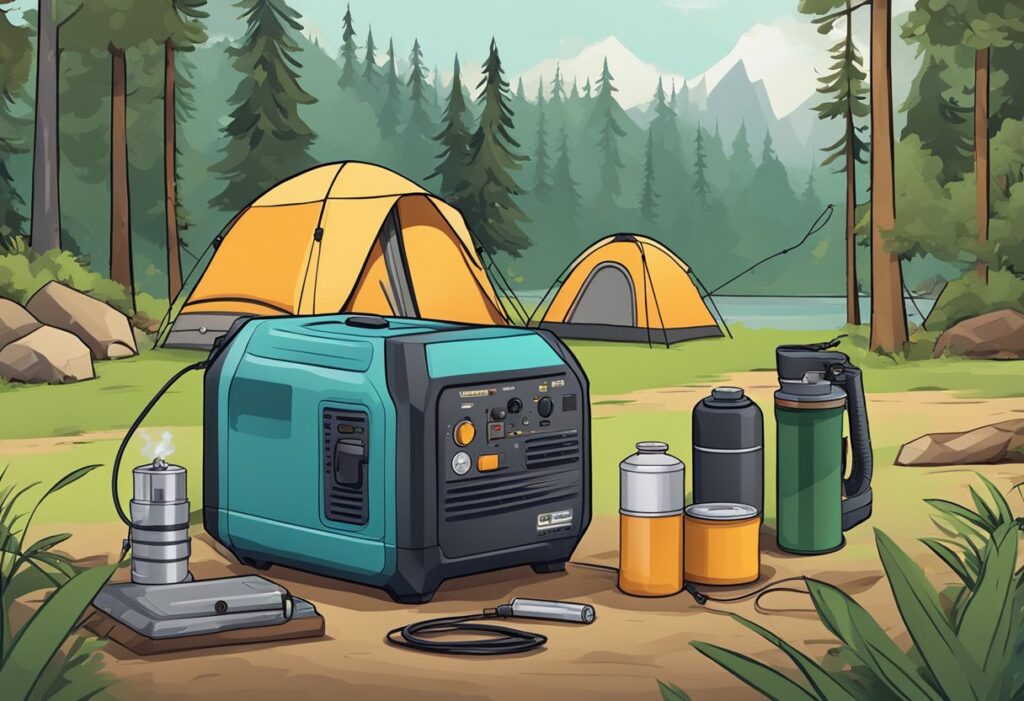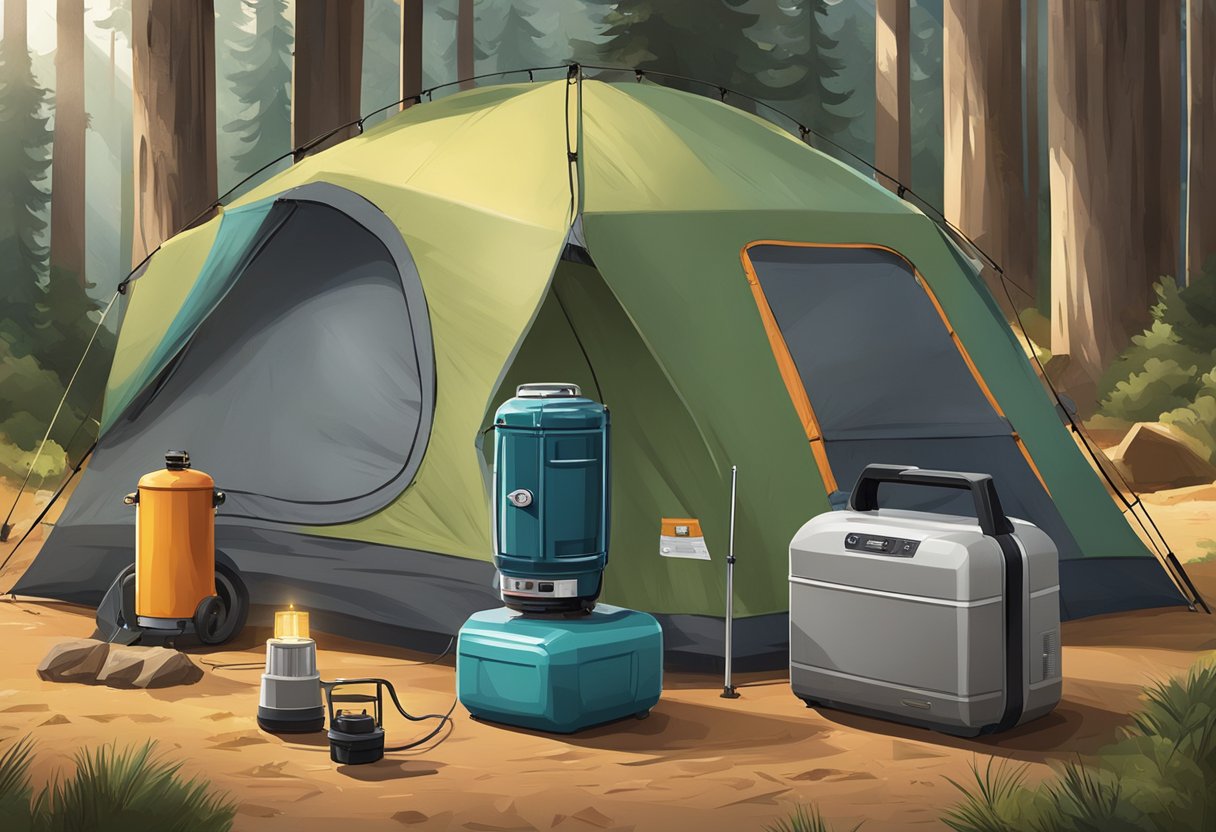Camping is a great way to explore the outdoors and enjoy nature. However, it can be challenging to live without electricity, especially if you plan to stay for a few days. A generator can provide you with the power you need to run your essential appliances and electronics while camping. But what size generator do you need for camping?

The answer to this question depends on several factors, such as the number of appliances you want to run, their power requirements, and the type of camping you plan to do. For example, if you plan to camp in an RV, you’ll need a larger generator than if you’re camping in a tent. Similarly, if you want to run power-hungry appliances like air conditioners or refrigerators, you’ll need a more powerful generator. It’s essential to choose the right size generator to ensure that you have enough power to meet your needs while camping.
Understanding Generator Basics
Wattage and Power Requirements
When it comes to choosing the right generator for camping, understanding wattage and power requirements is crucial. Wattage is a measure of the amount of electricity a device needs to operate. It is typically measured in watts (W), and can be found on the device’s label or in its manual.
The first step in determining the right size generator for your camping needs is to calculate the total wattage of all the devices you plan to power. This includes everything from your phone charger to your RV air conditioner.
It’s important to note that some devices require more power to start up than they do to run continuously. This is known as starting watts versus running watts. For example, an air conditioner may require 3,000 starting watts to turn on, but only 1,500 running watts to operate continuously.
Types of Generators
There are two main types of generators: portable and standby. Portable generators are the most common type for camping and outdoor activities. They typically run on gasoline or propane, and can be moved from one location to another.
Standby generators, on the other hand, are designed to provide backup power to a home or business during a power outage. They are typically connected directly to the electrical system and run on natural gas or propane.
When it comes to choosing a generator for camping, portable generators are the way to go. They are more affordable and easier to transport than standby generators.
In addition to the type of generator, it’s important to consider the amount of power it can produce. This is typically measured in amps or voltage. Higher amps or voltage means more power output.
Overall, understanding the basics of generators and power requirements is essential when choosing the right generator for your camping needs. By calculating the total wattage of your devices and choosing a portable generator with sufficient power output, you can ensure a comfortable and convenient camping experience.
Determining Your Camping Power Needs
When planning a camping trip, it is crucial to determine your power needs to ensure you have the right size generator to meet your needs. This section will cover two main areas to help you determine your camping power needs: assessing appliance and device usage and calculating total wattage.
Assessing Appliance and Device Usage
The first step in determining your power needs is to assess the appliances and devices you plan to use during your camping trip. Consider the following:
- Laptop: If you plan to bring a laptop, it typically requires 50 to 100 watts of power.
- Lights: LED lights typically require 5 to 30 watts of power.
- Refrigerator: A small refrigerator typically requires 100 to 200 watts of power, while a larger one may require up to 700 watts.
- Air conditioner: A small air conditioner may require 1000 to 2000 watts of power, while a larger one may require up to 5000 watts.
- TV: A small TV typically requires 50 to 100 watts of power.
- Microwave: A small microwave typically requires 600 to 800 watts of power.
- Coffee maker: A coffee maker typically requires 600 to 1200 watts of power.
Calculating Total Wattage
Once you have assessed the appliances and devices you plan to use during your camping trip, the next step is to calculate the total wattage. To do this, follow these steps:
- Identify all the appliances and devices you plan to use.
- Check the power ratings of each device. This is usually indicated in watts (W) and can typically be found on the device’s label or in its manual.
- Multiply the wattage of each device by the number of hours you plan to use it each day.
- Add the total wattage of all devices together to determine your total daily wattage.
By following these steps, you can determine the total wattage you will need for your camping trip. This information will help you choose the appropriate generator size for your needs, so you can enjoy a hassle-free camping experience.
Selecting the Right Generator Size
When it comes to selecting the right generator size for camping, there are several factors to consider. These include the size of the generator, the wattage requirement, the usage pattern, and the type of appliances that will be powered by the generator. Here are some subsections to consider:
Portable Generator Options
One of the most important considerations when selecting a generator for camping is portability. A portable generator is lightweight and easy to move, making it ideal for camping trips. Portable generators come in a variety of sizes and wattage capacities, so it is important to choose one that meets your specific needs.
RV Generator Considerations
If you plan on camping in an RV, you will need to consider an RV generator. RV generators are designed to be quiet and efficient, making them ideal for camping trips. When selecting an RV generator, it is important to choose one that has enough wattage to power all of your appliances.
To determine the wattage requirement for your camping trip, you can use a wattage calculator. This will help you determine the amount of power you will need to run your appliances. Once you have determined the wattage requirement, you can select a generator that meets your needs.
It is important to note that the wattage requirement for your camping trip will depend on your usage pattern. If you plan on using a lot of appliances, you will need a generator with a higher wattage capacity. If you plan on using fewer appliances, you can choose a generator with a lower wattage capacity.
In summary, when selecting the right generator size for camping, it is important to consider the size of the generator, the wattage requirement, the usage pattern, and the type of appliances that will be powered by the generator. By taking these factors into account, you can choose a generator that meets your specific needs and ensures a hassle-free camping experience.
Generator Features for Camping Comfort

When choosing a generator for camping, there are several features to consider to ensure a comfortable and enjoyable camping experience. Two important features are fuel efficiency and noise levels, as they can significantly impact the environment and the camping experience.
Fuel Efficiency and Types
Fuel consumption is a crucial factor to consider when choosing a generator for camping. The amount of fuel consumed by a generator will determine how long it can run and how much fuel you will need to bring with you on your camping trip. In general, diesel generators are more fuel-efficient than gas generators and can run for longer periods.
Another option to consider is a solar-powered generator. These generators use solar panels to convert sunlight into electricity and do not require any fuel. While they may not be as powerful as traditional generators, they are environmentally friendly and can be a great option for camping trips in sunny areas.
Noise Levels and Environmental Impact
The noise level of a generator can also impact the camping experience. Loud generators can disturb wildlife and other campers, and many campgrounds have noise regulations in place. In general, diesel generators are quieter than gas generators, but they can still be noisy.
For those who are environmentally conscious, it is essential to consider the environmental impact of the generator. Diesel generators produce more emissions than gas generators, and solar-powered generators produce no emissions. It is important to choose a generator that is as environmentally friendly as possible to minimize the impact on the environment.
In summary, fuel efficiency, noise levels, and environmental impact are crucial factors to consider when choosing a generator for camping. Diesel generators are more fuel-efficient and quieter than gas generators, but they produce more emissions. Solar-powered generators are environmentally friendly but may not be as powerful as traditional generators. By considering these factors, campers can choose a generator that meets their needs and ensures a comfortable and enjoyable camping experience.
Safety and Maintenance Tips
Operating Generators Safely
When operating a generator, safety should always be the top priority. Here are some safety tips to consider:
- Generators should be placed on a flat, stable surface to prevent tipping.
- Never operate a generator indoors or in an enclosed space, as this can lead to carbon monoxide poisoning.
- Keep the generator at least 10 feet away from any buildings or structures.
- Use heavy-duty extension cords that are rated for outdoor use and have grounded plugs.
- Do not touch the generator with wet hands or while standing in water.
- Turn off the generator and let it cool down before refueling.
Routine Generator Care
Proper maintenance is essential to ensure your generator is always ready to use when you need it. Here are some maintenance tips to follow:
- Check the oil level and air filter before each use.
- Change the oil and oil filter every 50-100 hours of use or as recommended by the manufacturer.
- Clean the air filter every 25 hours of use or more frequently if the generator is used in dusty conditions.
- Check the spark plug and replace it if it is worn or fouled.
- Drain the fuel from the tank and carburetor if the generator will not be used for an extended period.
- Use a fuel stabilizer to prevent the fuel from going stale and clogging the carburetor.
By following these safety and maintenance tips, you can ensure that your generator is safe to use and always ready when you need it. Additionally, it is worth noting that some generators are designed to be more fuel-efficient than others. If fuel economy is a concern, consider purchasing a generator that is specifically designed for this purpose. Finally, if you plan to use sensitive electronics with your generator, be sure to purchase a generator with a clean power output to prevent damage to your devices.